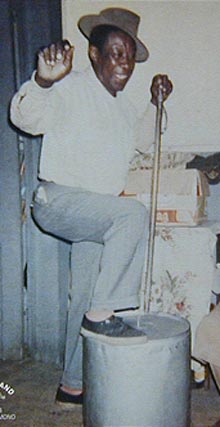
Will Shade Tribute
January 27, 2008 • Chicago, Illinois
May 3, 2008 • Memphis, Tennessee
Aug 1, 2009 • Memphis, Tennessee
Arlo Leach writes: I recently had an opportunity to hear an interview with Will Shade, Jennie Mae Clayton and Dewey Corley, conducted by Richard B. Allen and William Claxton on May 25, 1960. The audio recording is held by the Hogan Jazz Archive at Tulane University and the following quotes are published with their permission.
Dick Allen's interview with Will, Jennie Mae and Dewey is 36 minutes long. Dick questions Will for the first 13 minutes, then brings in Jennie Mae for a few questions, but Will quickly jumps back in. For the last 13 minutes, the interviewer focuses on Dewey Corley, but brings Will back into the conversation several times. Will comes across as enthusiastic and open, with an excellent memory, easily recalling details from his childhood and his busiest years as a performer.
The interviewer asks about Will's childhood, his start in music, the other musicians he remembers listening to and working with and his current activities. Here are some points that clarify stories or answer questions I've heard about him and his band:
- Will's parents both played music. His father was a shoemaker, but also built and played guitars –– "blues [and] barrelhouse stuff." However, his father died when Will was young. (Will Shade Sr.'s death certificate gives a date of death as April 8, 1903, when Will was five years old. It confirms his occupation as shoemaker, gives a place of birth as Georgia and gives a cause of death as "gunshot wounds of abdomen and thigh.") Will says his first music lessons were from his mother, who preferred spirituals.
- Will spells out his nickname as "S-U-N B-R-I-M-M-E-R." His explanation for the nickname is that his grandmother's name is Annie Brimmer, and "she raised me and everybody called me Sun Brimmer." S-O-N Brimmer would make more sense in that context, but he doesn't elaborate on his choice of spelling.
- When asked about local washboard players, Will names Robert Burse (brother of Memphis Jug Band stalwart Charlie Burse), which he pronounces "burse." In a 1957 interview by Sam Charters, he pronounced Charlie's last name as "bursey," so the correct pronunciation of this name is still unclear.
- Another naming question is clarified here. Some transcriptions of his interviews list one of his early associates as "Lionhouse" and some as "Roundhouse," but Will clearly says "Roundhouse" a couple times in this interview. Roundhouse was his first jug player.
- Will lists the instruments he plays as "guitar, harmonica, jug and bass — streamline bass.… That's the can that I play on. One string." He says he started playing the bass 10-15 years ago, which correlates to existing photos; all earlier photos show him playing jug or guitar, but many later photos show him playing bass.
- At the time of this interview, most of the members and contemporaries of the Memphis Jug Band had died. Of his band's original lineup, he says, "After they died out I had to get new members and re-learn them over." His list of jug players sounds like Spinal Tap's list of drummers: Roundhouse died and was replaced by Charlie Polk, who died and was replaced by Jab Jones, who quit the band after an argument and was replaced by Ham Lewis.
- Ham Lewis had previously played with the Dixieland Jug Blowers, about whom Will says, "They're good people — good players." He names Ham as the best jug player he ever heard, and Lonnie Johnson as the best guitar player he ever heard.
- In the Chasin' Gus's Ghost documentary, Sam Charters says, "The jug was never an essential part of the Memphis Jug Band. They did it because the record company asked." But in this interview, Will and Dewey both refer to jug playing and jug players much more often than other jug band instruments. Will only mentions his producer, Ralph Peer, once, and refers to performing more often than recording. He also seems firmly in control of his musical choices, saying, "I never did go to shows much…. I'd be busy trying to write up my own songs…. I'd sit up night and day, me and my wife, 'til I'd get my tune right, and then I'd rehearse it."
- Will remembers the outro of "It Won't Act Right," where someone shouts, "Get on outta there, tout de suite," and explains that he had a dog named Tout de Suite!
- A mug shot of Will Shade from the Shelby County Penal Farm has appeared online, with speculation about what he might have been arrested for. In this interview, he mentions that getting caught busking would lead to a trip to the penal farm. He doesn't explicitly say he was arrested for this himself, but he does offer amusing impersonations of the blues songs sung by the prisoners there, and of the overseers.
- He describes his current performance schedule as, "About once every month, every three months, sometimes twice a week, sometimes no times a week. Just everything went flop here. Ain't nothing here."
- When asked who were his teachers, Dewey says, "Son Brimmer. That's my background." He credits Will with teaching him to play jug, then says he has learned a little piano on his own, and "I got some little 'kazooks' that I blow myself — he didn't learn me that." When asked to demonstrate the kazoo, he starts to play and Will immediately jumps in on guitar for a brief jam.
- Will and Dewey are clearly proud of their accomplishments. Will remembers playing for 10,000 people at a Westinghouse / Memphis Power & Light event. When asked to recount other musicians he has known, Dewey mentions Little Walter: "Plays with Muddy Waters now. We teached him around here…. They ain't got nothing on us."